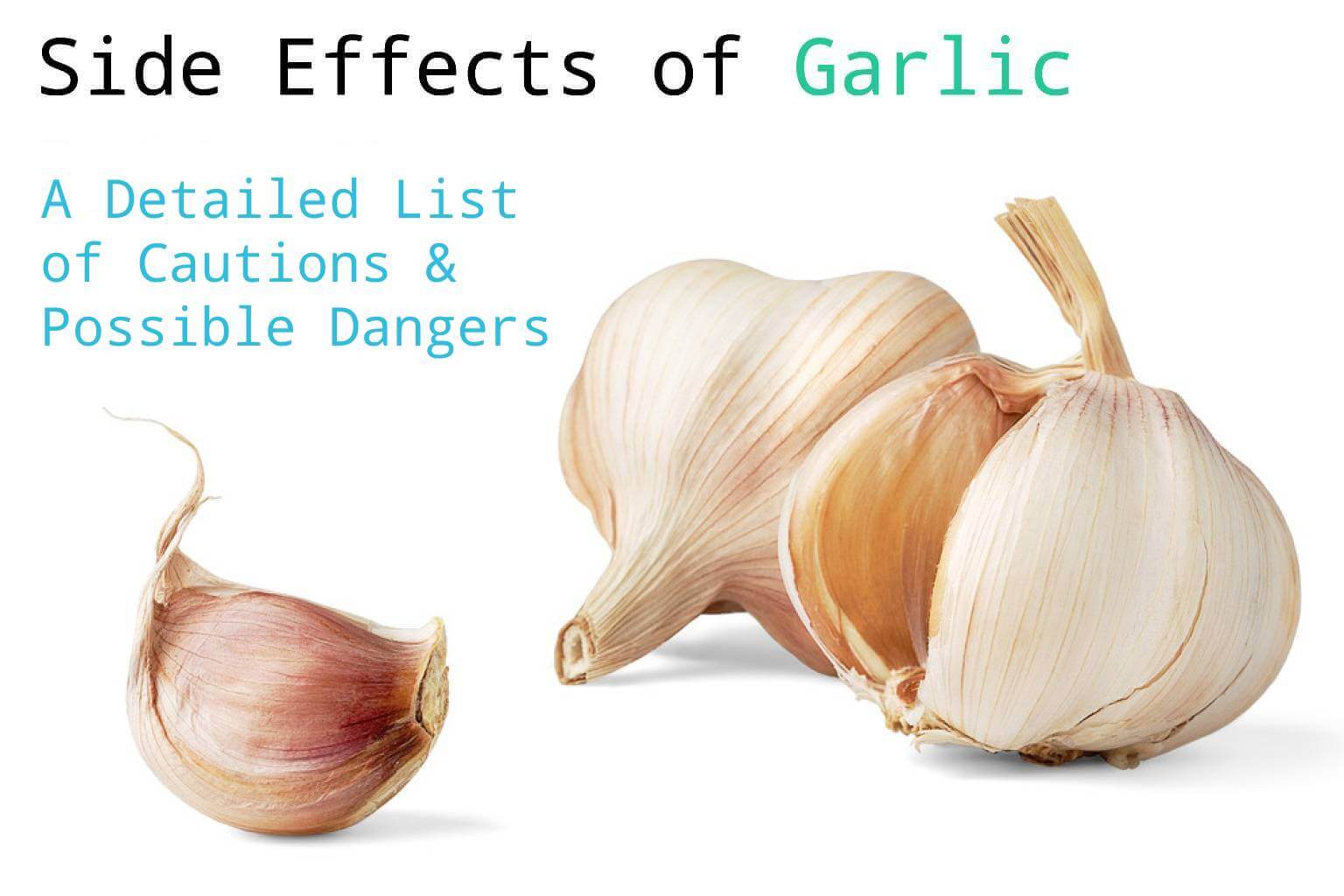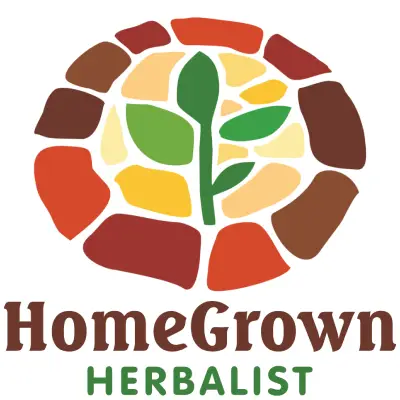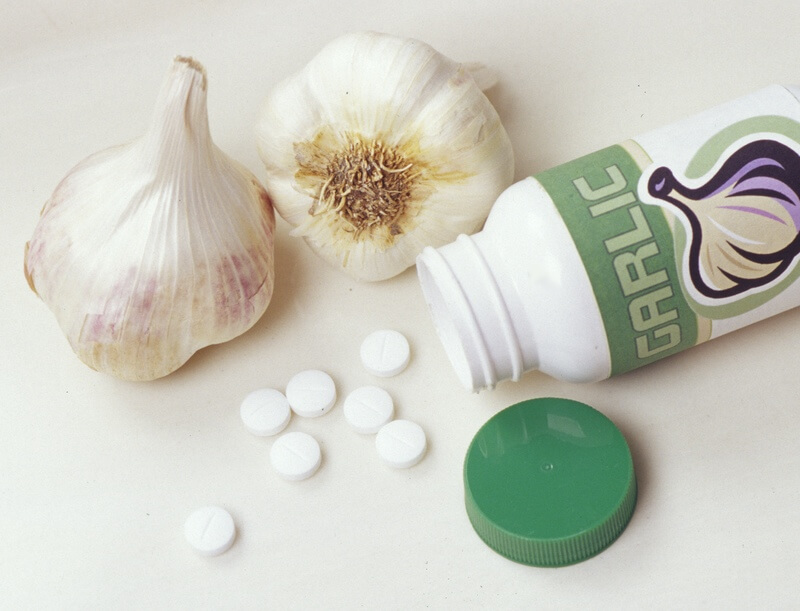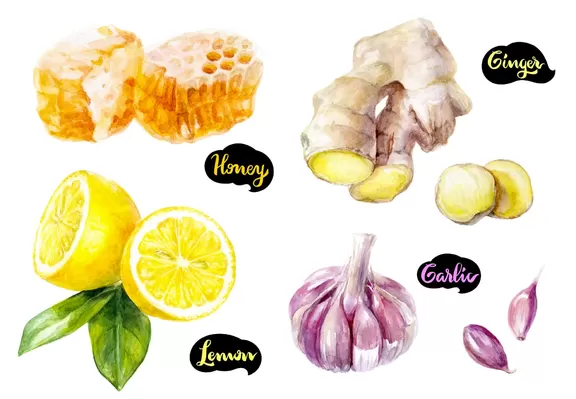
Garlic (Allium sativum) is a food that is generally very safe to eat. Yet, eating it regularly may cause some limited side effects. The most common side effect of regular garlic consumption is bad breath and body odor. If you are not allergic to garlic, and you are not taking high doses of it, this is likely the only side effect you will see.
Therapeutic doses of garlic, on the order of 7 cloves of garlic a day, may cause some gastrointestinal dysfunction. Stomach aches, flatulence (gas), heartburn, diarrhea, and nausea are some possible side effects of eating a lot of garlic. These gastrointestinal side effects may be exacerbated if the garlic is eaten on an empty stomach.
Many people use garlic to treat skin or nail problems; and, garlic will work to treat many fungal conditions like ringworm. The problem arises when they use garlic too frequently, or for too long. What sometimes happens is chemical burns. Yes, you can severely burn your skin if you put garlic on it for too long or too frequently! We will discuss this more in-depth later on in this article.
Possibly the most important side effect to consider, like all herbs and foods, is allergic reactions. If you have an allergy to garlic, you can experience some severe side effects. This, of course, goes without saying. Stay away from herbs and foods you are allergic to!
What is important to understand about allergic skin reactions to garlic, is that it can be a delayed reaction. The scientific term for this is "type IV hypersensitivity reactions." These allergic responses happen 12 hours after being exposed to an allergen. The maximum amount of time a delayed reaction like this can occur is between 48 and 72 hours.
So if you are unsure about how you will react to garlic, you should do a patch test with the herb first. And, make sure to wait 12 hours or more to see if any delayed allergic response occurs. We will discuss allergic reactions to garlic more later on.
Dr. John Herzog (MD)
Dr. John Herzog, a "survival surgeon" from Maine explains what home remedies work best in a crisis situation.
This may be important in the event you require first-aid or are in an emergency situation without easy access to a hospital. Dr. John Herzog has assembled a large collection of home remedies for such scenarios.

Typical Side Effects of Garlic for Healthy Individuals
A study, which focused on the health effects of garlic, was published in the journal American Family Physician [72.1 (2005): 103-106].(source 1) The study reports that taking one or two cloves of raw garlic every day is considered safe for adults. Concerning side effects, the study states what are generally the only side effects a healthy individual has to worry about when taking garlic. According to the study, these side effects are:
- The most common side effects are bad breath and bad body odor.
- Eating a lot of garlic, especially on an empty stomach, can cause stomach aches and flatulence (gas).
- Eating a lot of garlic can also alter the bacteria in the gut; as garlic is a potent antibacterial.
- Applying raw garlic too frequently, or for too long a time, can cause contact dermatitis (a red, itchy rash caused by direct contact with a substance or an allergic reaction to it),(source 7) blisters, or burns.
- If a person is taking anticoagulants (medications that help prevent blood clots), they should be cautious when taking garlic; this is due to its antithrombotic properties (an antithrombotic is a substance that reduces the formation of blood clots).
- You should stop taking garlic 7 to 10 days before a surgery because garlic can extend bleeding time.
A study published in the Archives of Internal Medicine [161.6 (2001): 813-824](source 5) analyzed groups of studies on garlic and cardiovascular effects. Making this review relevant to this discussion was it looked at the side effects reported from taking garlic.
This review found that 8 studies reported that subjects given garlic treatments had bad breath or body odor. Other reports from studies stated that people given garlic tablets also had bad breath and body odor and also reported abdominal pain, feeling of fullness, anorexia, and flatulence.
73 more studies reviewed showed that ingesting garlic caused dermatitis (skin rash), rhinitis (nasal congestion, runny nose, sneezing, and itching), asthma, Meniere disease (an inner ear disorder causing vertigo), bleeding, longer time to blood clotting for people taking the anticoagulant warfarin sodium, abdominal pain, esophageal pain, and other side effects.
It should be noted that the frequency (commonality) of these side effects was not studied by this review; so any adverse reaction reported is stated. Therefore, these may not be common side effects of garlic; possibly being spuriously correlated to garlic use (not actually related).
Claire Goodall’s Amazing Guide
Clair Goodall is a bee-obsessed, natural medicine convert from Minnesota (USA). And, she does keep bees!
Clair has created 350+ page book documenting how to replace the toxic products and medications in your home with healthier, all-natural alternatives.

Bad Odor is the Most Common Side Effect of Garlic

A study, published in Molecular Nutrition & Food Research [51.11 (2007): 1386-1397],(source 7) looked at the adverse reactions that happen when people take garlic. The study looked at a lot of research and made some good conclusions; one of which was garlic causes bad smelling breath and sweat.
Foul smelling breath and sweat odor usually happens after several days of taking garlic powder. Other studies and clinical trials have consistently demonstrated that bad breath and body odor are the most common complaints of people who take garlic.
In 10 studies of people taking 600mg to 900mg of garlic powder daily for 8 to 12 weeks, the most common side effect of taking this herb was "garlic breath" and bad body odor.
This study also cites research where people took varying amounts of garlic powder tablets. Of 123 participants in the study, slight and moderate garlic odor was reported in the following rates: 10% in the placebo group (the group not given garlic), 24% for people taking 300mg / day, 40% for those taking 900mg / day, and 45% for those taking 1,200mg / day.
This paper concludes that garlic odor is the most common adverse side effect of taking garlic.
Allergic Reactions to Garlic
One study stated that garlic rarely causes allergic reactions. Yet, when these reactions occur, they can range from slight irritation to life threatening situations.(source 2)
The Molecular Nutrition & Food Research [51.11 (2007): 1386-1397](source 7) study also discusses allergic reactions. According to this paper, there have been multiple case reports for allergic contact dermatitis (also called contact eczema; it is a skin rash caused by contact with a substance) and urticaria (hives). Single case reports document episodes of anaphylaxis.

Comprehensive Herbalist School
Dr. Patrick Jones, founder of the HomeGrown Herbalist School of Botanical Medicine has been a practicing veterinarian for over 25 years. He is also a clinical herbalist and traditional naturopath.
Kevin Harrington, Original Shark from ABC’s Shark Tank, stands behind Dr. Patrick Jones and HomeGrown Herbalist.
Learn More
Comprehensive Herbalist School
Dr. Patrick Jones, founder of the HomeGrown Herbalist School of Botanical Medicine has been a practicing veterinarian for over 25 years. He is also a clinical herbalist and traditional naturopath.
Kevin Harrington, Original Shark from ABC’s Shark Tank, stands behind Dr. Patrick Jones and HomeGrown Herbalist.Learn More
This same study reported that the German Commission E reports that garlic in rare instances might cause allergic reaction; and, this has been confirmed by a study that showed allergic reactions happened in 1.1% of users of garlic at therapeutic doses (a 300mg garlic powder tablet taken three times a day).
And, case reports of allergic reactions to garlic use include hives, contact dermatitis, swelling underneath the skin, pemphigus (a rare group of blistering autoimmune diseases that affect the skin and mucous membranes), and anaphylaxis.
Drug Interactions With Garlic
According to the U.S. National Library of Medicine StatPearls paper "Herbal Supplements," (source 9) garlic might act as a blood thinner by stopping platelets and cause anticoagulant drugs to not work. Yet, garlic did not affect blood clotting when compared to aspirin.
Garlic has been demonstrated to interact with drugs transported by P-glycoprotein (P-glycoprotein is one of the drug transporters that determine the uptake and outflow of a range of drugs) and decreases the concentrations of these drugs.(source 9) These drugs include:
- Tacrolimus
- Verapami
- Digoxin
- Doxorubicin
- Colchicine
- Rosuvastatin
- Quinidine

HomeGrown Herbalist Herb Shoppe
Owner of HomeGrown Herbalist Dr. Patrick Jones is a practicing veterinarian, Clinical Herbalist, and traditional naturopath. He owns and operates Fairview Animal Hospital in Buhl, ID.
Their herb shoppe provides herbs, essential oils, and tools. If you have some time, check it out!
Learn More
HomeGrown Herbalist Herb Shoppe
Owner of HomeGrown Herbalist Dr. Patrick Jones is a practicing veterinarian, Clinical Herbalist, and traditional naturopath. He owns and operates Fairview Animal Hospital in Buhl, ID.
Their herb shoppe provides herbs, essential oils, and tools. If you have some time, check it out!Learn More
A study published in the Middle-East Journal of Scientific Research stated that garlic appears to particularly affect the HIV drug saquinavir (which goes by the brand names Fortovase and Invirase). Garlic is able to lower the levels of this drug in the blood severely--by about 50%.(source 2)
The study in Molecular Nutrition & Food Research [51.11 (2007): 1386-1397](source 7) stated that garlic can cause interactions with anticoagulants or drugs used to treat HIV. Other conventional drugs that might interact with garlic include the anti-diabetic chlorpropamide and the analgesic drug paracetamol (acetaminophen).
How Garlic Interacts with Drug Metabolizing Enzymes
When considering drug interactions with garlic, Cytochrome P450 (CYP) enzymes are important to consider. CYP enzymes are essential for the metabolism of many different drugs. Although there are more than 50 different types of CYP enzymes, six of them metabolize 90% of all drugs.(source 8)
CYP enzymes can also be inhibited or encouraged by drugs. The result of the change in CYP enzymes can be significant interactions between drugs. These interactions can cause unforeseen side effects or cause a drug to fail.(source 8)
The study in Molecular Nutrition & Food Research [51.11 (2007): 1386-1397](source 7) stated that CYP is the most important phase I drug metabolizing enzyme system; and is responsible for the metabolism of a wide variety of drugs. And, this paper reported how garlic affected CYP.
The paper cites a study that demonstrated a 28 day treatment with garlic oil did not change the level of the drug midazolam (midazolam is a drug that can be used to monitor CYP) in 12 healthy elderly subjects.
This same paper cites another study that demonstrated a treatment with garlic extract for 14 days did not change the levels of a drug that is used to monitor CYP.

Comprehensive Herbalist School
Dr. Patrick Jones, founder of the HomeGrown Herbalist School of Botanical Medicine has been a practicing veterinarian for over 25 years. He is also a clinical herbalist and traditional naturopath.
Kevin Harrington, Original Shark from ABC’s Shark Tank, stands behind Dr. Patrick Jones and HomeGrown Herbalist.
Learn More
Comprehensive Herbalist School
Dr. Patrick Jones, founder of the HomeGrown Herbalist School of Botanical Medicine has been a practicing veterinarian for over 25 years. He is also a clinical herbalist and traditional naturopath.
Kevin Harrington, Original Shark from ABC’s Shark Tank, stands behind Dr. Patrick Jones and HomeGrown Herbalist.Learn More
The study concluded that the trials it investigated indicate that garlic has no effect on CYP enzymes in humans in vivo (a test on a living subject). Additionally, it has been consistently shown that several water-soluble components of aged garlic extract (AGE, which has been shown to be nearly completely devoid of active sulfur compounds found in fresh garlic) have been demonstrated not to affect CYP in vitro (not in a living subject but in a test environment).
Garlic’s Possible Interaction with Blood Thinners

The 2015 Middle-East Journal of Scientific Research also stated garlic should not be used by people taking blood thinners like warfarin (brand name Coumadin).(source 2)
Yet, the danger of using garlic while taking the common blood thinner warfarin (common brands: Jantoven, Coumadin) may not be too great. A study published in American Family Physician [77.1 (2008): 73-78](source 10) stated that case reports (events documented by a study; typically of an individual) have documented interactions between warfarin and garlic. Accordingly, garlic has an intrinsic antiplatelet effect; but, one clinical trial showed that garlic is safe and did not cause a risk for bleeding of monitored patients taking warfarin.
A quote, taken from this study, states the following about garlic and its interactions with warfarin:
Interaction unlikely based on a clinical study that found garlic is relatively safe and poses no serious hemorrhagic risk for closely monitored patients taking warfarin oral anticoagulation therapy...
American Family Physician [77.1 (2008): 73-78]
Yet, the study cautions to suspect garlic is causing an interaction if bruising or bleeding occurs despite good results from a prothrombin time test (a test to evaluate blood clotting).
So, to be safe, it is better to err on the side of caution and avoid taking garlic if you are on blood thinners.
The Side Effects of Taking Garlic on an Empty Stomach
Yes, eating a good amount of garlic on an empty stomach can cause some mild side effects. One study stated if a fresh garlic bulb is eaten on an empty stomach, this can occasionally cause heartburn, diarrhea, nausea, or vomiting.(source 2) Another study also echoed this sentiment, stating that eating "excessive" amounts of raw garlic, especially on an empty stomach, can cause an upset stomach, flatulence (gas), and will change the microscopic life of the intestines.(source 3)
Another study, published in 2021 in the Asian Journal of Pharmaceutical Research and Development, stated that eating garlic on an empty stomach can occasionally cause heartburn, nausea, diarrhea, and vomiting.(source 4)
A study published in The Journal of Nutrition [131.3 (2001)](source 6) may shed some light as to the effects of garlic products on an empty stomach. The study used a device to put garlic products directly into the stomach of dogs, and analyzed how the tissue lining the stomach reacted to these products. Thus, this may be more like what it is like to take one of these garlic products on an empty stomach; as an empty stomach will allow for more contact of the garlic to the stomach lining.

HomeGrown Herbalist Herb Shoppe
Owner of HomeGrown Herbalist Dr. Patrick Jones is a practicing veterinarian, Clinical Herbalist, and traditional naturopath. He owns and operates Fairview Animal Hospital in Buhl, ID.
Their herb shoppe provides herbs, essential oils, and tools. If you have some time, check it out!
Learn More
HomeGrown Herbalist Herb Shoppe
Owner of HomeGrown Herbalist Dr. Patrick Jones is a practicing veterinarian, Clinical Herbalist, and traditional naturopath. He owns and operates Fairview Animal Hospital in Buhl, ID.
Their herb shoppe provides herbs, essential oils, and tools. If you have some time, check it out!Learn More
The garlic products tested by this study included aged garlic extract (AGE) powder, dehydrated raw garlic powder (RGP), dehydrated boiled garlic powder (BGP), and two commercially available enteric-coated garlic products.
The results of the experiment showed that RGP caused severe stomach lining (mucosal lining) damage, and some erosion. The BGP preparation caused reddening of the stomach lining. Interestingly, the study found that AGE did not cause any damage to the stomach lining. The study speculated that aging garlic could be the most effective method to eliminate the harsh effects of raw garlic.
To answer the question about garlic on an empty stomach, research indicates taking raw garlic on an empty stomach can cause some side effects. Yet, this is probably going to be dependent upon how much garlic you eat. And, it appears that aged garlic extract will be much more gentle on the stomach lining; and may not cause any side effects when taken on an empty stomach.
Side Effects of Garlic on the Skin
We’ve already discussed allergic reactions; and as the German Commission E reports points out; in rare cases allergic reactions can occur. To reiterate what can happen to the skin in the event of an allergic reaction, case reports state hives, contact dermatitis, swelling underneath the skin, and pemphigus (a rare group of blistering autoimmune diseases that affect the skin and mucous membranes) can occur.
Yet, an important side effect of garlic–allergic reactions aside–are burns. Garlic can easily cause chemical burns on the skin. If you apply garlic too frequently, or too long, to the skin it can get burned. This may be especially true about crushed / pureed garlic.
Let’s take a look at some research that documented a garlic induced skin burn.
A case report entitled "A Garlic Burn" documents just that; and, was published in Case Reports [2018 (2018): bcr-2018].(source 11) According to this report, the subject was a woman who developed burns from garlic after using it to treat nail fungus. The report states the following:
A 45-year-old woman presented with a 12 hour history of painful blisters and erythema [unusual redness] over the dorsum [the upper surface] of her left great toe. The patient reported applying freshly sliced raw garlic to the dorsum of her left great toe during the past 4 weeks for up to 4 hours a day to treat a fungal nail infection.
Case Reports [2018 (2018): bcr-2018]

Comprehensive Herbalist School
Dr. Patrick Jones, founder of the HomeGrown Herbalist School of Botanical Medicine has been a practicing veterinarian for over 25 years. He is also a clinical herbalist and traditional naturopath.
Kevin Harrington, Original Shark from ABC’s Shark Tank, stands behind Dr. Patrick Jones and HomeGrown Herbalist.
Learn More
Comprehensive Herbalist School
Dr. Patrick Jones, founder of the HomeGrown Herbalist School of Botanical Medicine has been a practicing veterinarian for over 25 years. He is also a clinical herbalist and traditional naturopath.
Kevin Harrington, Original Shark from ABC’s Shark Tank, stands behind Dr. Patrick Jones and HomeGrown Herbalist.Learn More
This case report states that garlic can harm the skin in two ways: it can cause direct chemical burns and delayed allergic reactions that result in contact dermatitis (a skin rash).
To further explain these allergic reactions, they are known as type IV hypersensitivity reactions. Essentially, this means that if you are allergic to garlic the immune system will become "hypersensitive" and produce an allergic reaction. Type IV hypersensitivity reactions are known as delayed reactions; due to it occurring more than 12 hours after being exposed to an allergen. The maximum amount of time a delayed reaction like this can occur is between 48 and 72 hours.(source 12)
But, you probably have to be allergic to garlic to see an allergic response. But, it is important to know that the reaction could be delayed. This may be important when you conduct a "patch test" to see how you respond to an herb (a patch test involves placing a very small amount of an herb / essential oil on the skin and letting it stay there for a while to determine how you will react to it).
Referring back to the case report, "A Garlic Burn"(source 11) the authors state that factors that determine the severity of a garlic burn include:
- The quantity of garlic used
- The freshness of the garlic
- Duration of contact
- The presence of pre-existing skin problems
- Skin sensitivity
The Side Effects of Eating Raw Garlic Everyday

Garlic is a food which is safe to eat; but like many things, it is only safe in moderation. There are many health benefits to taking garlic, and sticking to a safe dose each day will probably only cause the side effect of bad breath and body odor. But, if you take too much garlic, the liver can be damaged.
A Safe Dose of Garlic
The Molecular Nutrition & Food Research [51.11 (2007): 1386-1397](source 7) study stated that allergic reactions happened in 1.1% of users of garlic at therapeutic doses. The therapeutic dose was a 300mg garlic powder tablet taken three times a day. So this can be a good benchmark for how much garlic is therapeutic.
A study published in Cancer Epidemiology, Biomarkers & Prevention [3.2 (1994): 155-160](source 13) had 16 human subjects ingest a daily doses of garlic extract, which was approximately equal to six to seven cloves of garlic; this was done for 3 months. So this also seems like a good benchmark for safety.
Unsafe Doses of Garlic
Garlic is a food item, and it is hard to eat enough of it to actually cause harm. One study, published in Tropical Gastroenterology [27.1 (2006): 26-30],(source 14) found how garlic would damage the liver of rats when fed excessive amounts. This study gives us a good approximation as to what the upper safe limits of garlic consumption might be.
The rats were given 0.1, 0.25 and 0.5 g/kg body weight each day for 28 days. If you weighed 80kg (176lbs) that would mean 0.1 grams of garlic per kilogram of body weight would equate to 8 grams of garlic. On the high end, it would mean 40 grams of garlic a day.
Concerning the study results on the rats given the garlic, the study found that 0.1 and 0.25 were safe doses of garlic. But higher doses showed the potential to cause liver damage. One rat given 0.5g garlic / kg body weight showed tissue changes in the liver.
The Right Dose of Garlic Each Day
Therefore, it can be assumed that a few cloves of garlic a day is going to be quite safe; and probably very good for your health. But, if you go to extremes, and eat a lot of garlic daily, this could cause some liver problems–as well as put you at more risk for developing some side effects.
A study published in Nutrients [12.3 (2020): 872](source 15) had this to day about garlic dosage:
Clinical studies reported that low doses of garlic are safe, whereas therapeutic doses might cause mild gastrointestinal disorders, while high doses have been reported to cause liver damage.
Nutrients [12.3 (2020): 872]
It would probably be wise to consult a medical doctor before you start a regimen of garlic at therapeutic doses. This is probably especially true if you struggle with liver problems.
About the Author
Nick Gross is a natural medicine enthusiast who has been researching and writing about natural medicine since 2008. Nick is primarily a web developer, but also researches and authors written and video content about natural health. Nick has a bachelor’s degree in Management Information Systems from the University of Northern Iowa.
More on Nick GrossImportant Disclosures & Disclaimers
It is important to use the information you find on Herbsey.com in the right way. Also for legal reasons, these disclaimers and disclosures are necessary. For further information about each, feel free to click the link provided to the page on this website that provides more information.
Medical Disclaimer
The information on this website is not a prescription for anyone. This information is for informational or educational purposes only, and is not a substitute for professional medical advice or consultations with healthcare professionals.
Advertisement Disclosure
Some of the links provided on this article and website are affiliate links. If you purchase a product after clicking on these links, Herbsey.com will earn a commission. Herbsey.com promotes various products through advertisement and text links. For more information: Our Advertisements.







